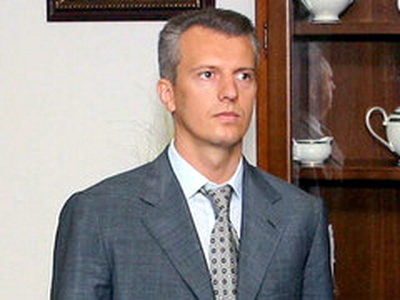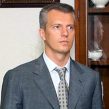
Ukrainian President Yanukovych Continues to Reshuffle Government
Publication: Eurasia Daily Monitor Volume: 9 Issue: 41
By:

Ukrainian President Viktor Yanukovych continues reshuffling his government with an eye to the parliamentary election scheduled for October 28. Political lightweights are being replaced with heavyweights and individuals personally loyal to Yanukovych. At the same time, the transfer of the influential election campaign manager for Yanukovych and his Party of Regions (PRU), Andry Klyuyev, from the post of first deputy prime minister to a relatively low-key position of chief security adviser has left many local observers puzzled. Through Klyuyev, Yanukovych may be creating a new center of influence within the ruling elite.
Yanukovych started the reshuffle at the top last November, when he appointed two individuals reportedly linked to his older son Oleksandr, Vitaly Zakharchenko and Oleksandr Klymenko, as respectively interior minister and tax chief. Local pundits and journalists immediately branded them, together with Serhy Arbuzov who was appointed as the central bank governor in December 2010, as “the family group.” This past January, Yanukovych promoted Valery Khoroshkovsky, a person from “the gas lobby” – that is, with reported links to gas and chemical oligarch Dmytro Firtash who co-owns the gas trader RosUkrEnergo with Gazprom – from security chief to finance minister (see EDM, January 30).
On February 8, Yanukovych replaced Admiral Mykhaylo Yezhel with a civilian, Dmytro Salamatin, in the post of defense minister. Yanukovych has long been dissatisfied with slow reform in the army; what is more, Yezhel was involved in corruption scandals so his dismissal was only a question of time. Salamatin had before this appointment headed the state defense industry company and arms exporter Ukroboronprom. He moved to Ukraine from Russia in 1999 and is reportedly the son-in-law of former Russian Deputy Prime Minister Oleg Soskovets, who was very influential in the mid-1990s (Ukrainska Pravda, February 8; Zerkalo Nedeli, February 11). Former KGB officer Ihor Kalinin, who was promoted to chief of the security service (SBU) on February 3, also has roots in Russia.
Following Salamatin’s new appointment, two of his former deputies at Ukroboronprom became deputy defense ministers. Yanukovych also replaced the Chief of the General Staff, Hryhory Pedchenko, who had served in this position since May 2010 with his former deputy, Volodymyr Zamana. Pedchenko reportedly failed to find common language with Salamatin (Kommersant-Ukraine, February 20).
On February 14, Yanukovych relieved Andry Klyuyev of his duties as first deputy prime minister and economic development minister and appointed him as secretary of the National Security and Defense Council (NSDC), which is chaired by Yanukovych. Klyuyev replaced on the council Raisa Bohatyryova, who was appointed to serve concurrently as “humanitarian” deputy prime minister and health minister. The decision on Klyuyev may have been spontaneous and not well thought through given that the position left by him remained vacant for more than a week.
Klyuyev, a businessman-cum-politician from Yanukovych’s native region of Donetsk, has been equally distant from “the family group,” “the gas lobby” and the influential oligarch Rinat Akhmetov. Yanukovych trusted him to such an extent that Klyuyev has managed his and the PRU’s election campaigns and liaised, when needed, with Yanukovych’s bitter opponents from the camp of former Prime Minister Yulia Tymoshenko. As first deputy prime minister, Klyuyev supervised industry, including the military-industrial complex, and was the main negotiator with both the European Union and Russia. By contrast, the NSDC has been a not very influential advisory body with a small budget during the past several years.
Ukrainian pundits have almost unanimously ruled that Klyuyev was demoted. Ukrainska Pravda on February 15 said the new position was a “humiliation” for him while Zerkalo Nedeli said on February 17 that Klyuyev definitely lost the chance to replace Prime Minister Mykola Azarov. Kommersant-Ukraine reported on February 15, quoting a source from Yanukovych’s team, that Klyuyev could be punished for corruption. The source did not elaborate. Earlier, the same newspaper cited an anonymous source from the European Commission as saying that the Commission would freeze assistance to Ukraine over misspending, as a grant issued last year was spent not on energy saving projects as planned but on new transmission lines to connect new solar power plants in South Ukraine to the national power grid. The solar plants in question must be a business of Activ Solar, a Liechtenstein-registered company linked to Klyuyev (Kommersant-Ukraine, February 8).
Alternatively, it has been suggested that Klyuyev’s new appointment has not been a demotion or a punishment but an attempt to strengthen Yanukovych’s rule. Anatoly Hrytsenko, an opposition people’s deputy and former defense minister, suggested that the NSDC under Klyuyev would de facto become the PRU’s election headquarters (Interfax, February 14). Yanukovych explained his decision by the need to strengthen security (president.gov.ua, February 16). Klyuyev himself said he would supervise reforms in the uniformed agencies and focus on economic and energy security (liga.net, February 15). Klyuyev, being one of Yanukovych’s most loyal and able lieutenants, may try to raise the profile of the NSDC, transforming it into a center of power alternative to both the cabinet and the presidential administration like it was during President Leonid Kuchma’s first term in 1994-1999 and under President Viktor Yushchenko in 2005.
On February 22, Yanukovych rather unexpectedly promoted Khoroshkovsky to first deputy prime minister. On February 23, he offered the post of Economy Minister to the independent-minded oligarch Petro Poroshenko, who served a brief stint as NSDC secretary and then was Foreign Minister under Yanukovych’s predecessor, Viktor Yushchenko (UNIAN, February 22, 23).




